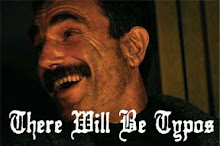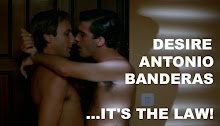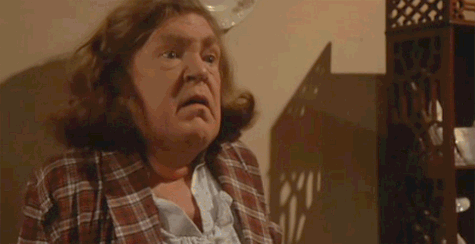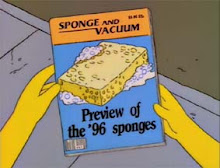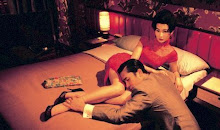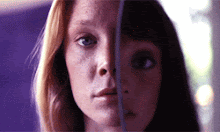Two orphans stricken by the grief of their parents' vicious double murder try to conceptualize the afterlife and learn to live by their own devices. A poignant tale of innocence shattered and new maturity formed in the wake of devastating circumstance... is devolved and putrefied into this Italian TV splatter movie from
gorehound Lucio
Fulci! Hence these kids are grating beyond belief, dubbed poorly by middle-aged women, and their parents return from the dead in the form of toy insects and shiny, illuminating rocks. It's all in the execution, and this one has several.
 The Sweet House of Horrors
The Sweet House of Horrors comes late in
Fulci's madcap career. From his stylish and frantic
giallo classics like
Lizard in a Woman's Skin,
The Psychic and
Don't Torture a Duckling, to his deranged
deathdream The Beyond,
Fulci is rightfully regarded amongst the Italian horror legends alongside Dario
Argento and Mario
Bava. But for every bloody and surreal bit of cinema splendor he created, he's also capable of slapping together some of horror's more embarrassing moments: girls threatened by snails and a
Top Gun poster in
Aenigma, slaughter-meets-
Flashdance in
Murder Rock, a nipple-collecting Donald Duck in
The New York Ripper, countless threatening eye zooms, and gore effects that wouldn't look out of place on a Kindergarten arts and crafts table. Not that this lessens
Fulci's fanbase by any means. Much like
Argento's films of late,
Fulci has mastered the form of drivel as art. His films can be sloppy and senseless, but their occasional ineptitude serves far more laughs than most genre-based comedies. Infinitely watchable for the very same reasons they're infinitely unwatchable. There's a childlike innocence to his excessive gore-mongering, and perhaps its what led him to the childlike perspectives behind his hailed/maligned
House by the Cemetery, and this complimentary film about kids, haunted houses and slapdash
dumbfuckery.

American TV movies find their horror in the likes of Tori Spelling or Tracey Gold, while the Italians prefer detached eyeballs or melted limbs. As
Sweet House of Horror's savage intro suggests, they're far less timid when it comes to TV violence. We instantly witness a home invasion turned double homicide in the most explicit way imaginable, and we witness it twice -- the second time for those who couldn't wait for the commercial break, or those who just wanted a little more time to comprehend how a forehead looks when it's being caved in. Mary and Roberto, aka. Mama and Papa, are bludgeoned with kitchen instruments, poked with fire irons, have their skulls smashed and eye sockets burst -- all before they're sent barreling down a cliff in the family car. The killer is soon revealed to be the family gardener, Guido, who hopefully trims his roses with a more delicate touch. His vicious ways would lead one to believe that the two now orphaned children, Sarah and Mark, are being placed into the clutches of a very sick and dangerous man. Lucky for them the serial murderer flees in terror once they chase him, shouting, "
Scaredy cat,
scaredy cat!"
The kids themselves are pretty cavalier about their parents' demise and the likely grim future that awaits them. While popping bubble gum and attending a funeral, Sarah and Mark discuss their misery with a lighter touch, "I bet it's just about over, he was just looking at his watch." "Father O'Toole has flat feet." "I'm famished..."

The kids return to their home with their new caretakers, oblivious to the fact that they're living on the very scene of the heinous crime. Hungry and lonely, the children are quick with their judgments, "Uncle Carlo and Aunt Marcia aren't bad people, they're simply idiots." Problem is, they're too young to get irony, "I wish (Mama and Papa) would come back, too. Only they're on the moon now." Kids...
But "Mama and Papa" do eventually come back (either from the moon, the beyond, or a land of shoddy visual gimmicks), and their methods for haunting are admirably abstract. First they appear as tiny flickering flames, floating over the children's beds in tiny fits of gleeful laughter.



They've made contact... Just not eye contact.Next up, an inexplicable haunting of rocks in the backyard... that glow... with menace! These parents are still new to this whole "apparition" thing.
 Just when you thought you were safe...
Just when you thought you were safe...
Ghost Rocks!Guido the Gardener is nevertheless terrified of Ghost Rocks. That and he still can't live with the crimes he's committed. While touching up paint on the home/crime scene, he relives his brutal acts blow-for-blow -- as does the film in order to pad the
runtime. Whilst losing his mind, Guido flees the home and is inexplicably attacked and killed by what he thinks is a dog -- but is actually a giant four-wheel truck. Now that the parents deaths are (confusingly) avenged, all that's left is to (confusingly) secure their home and make it safe for their family once again. Sarah assures Mark, "You know what Mama said. This is our house and no one can take it away from us."
After all that pseudo-haunting, the dead parents finally get the nerve and
skillset to show up in (undead) person. They give the kids hugs and a few supportive words, before
teleporting to the other side of the room to continue their conversation. Still working out the kinks, those two. Impressive though that they've learned to control the weather. They send powerful gusts of wind after the handicapped Mr. Colby, and send evil fog after Aunt Marcia and Uncle Carlo to prevent them from leaving the premises.
Levitation and Ghost Fog are easy.
Special effects are hard.  And apparently being a ghost is communicable.
And apparently being a ghost is communicable.In the meantime the family spans the bridge of the afterlife to partake in picnics and slow motion running.

But not everyone finds their undead outings so wholesome. Disturbed by what they perceive to be Sarah and Mark's psychosis, Aunt Marcia and Uncle Carlo invite in a famed German parapsychology medium. Together they perform a seance to rid the house of its evil supernatural energy -- the kind of horrifying spirits that shout professions of love for their kids, "We came back for the love of our children... Our children need us! Our children need our love! The power of love is greater than yours, greater than
anyone's! And love is something you are totally ignorant of."
Rather than deal with spirits that speak so candidly about love, Aunt Marcia and Uncle Carlo decide to demolish the house entirely. Fight as they may, Mama and Papa are weakened by their attempts to stop the encroaching bulldozer brought on by the crazed medium. Becoming ever-so-slightly more transparent as they lose strength, Mama and Papa revert to their most effective trick to save their home and the lives of their beloved children: Ghost Rocks!

Turns out Ghost Rocks are not only menacing in appearance, they also melt flesh.

The Sweet House of Horrors is saved once and for all... at least until something else completely random happens. In the end, the family that plays together stays together, and love (with a little help from Ghost Rocks) conquers all.

Here's to you Lucio
Fulci, with your childlike spirit AND approach to screenwriting.





















































